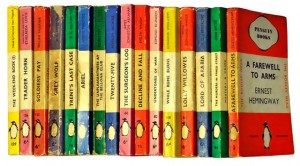 By now most everyone who follows artsjournal.com and the Amazon dispute has heard of its strange use of George Orwell in its (shockingly mishandled) dispute with the publishing sector. The New York Times reports:
By now most everyone who follows artsjournal.com and the Amazon dispute has heard of its strange use of George Orwell in its (shockingly mishandled) dispute with the publishing sector. The New York Times reports:
The freshest part of Amazon’s call to arms was the history lesson. It recounted how the book industry hated mass-market paperbacks when they were introduced in the 1930s, and said they would ruin the business when they really rejuvenated it. Unfortunately, to clinch its argument, it cited the wrong authority:
“The famous author George Orwell came out publicly and said about the new paperback format, if ‘publishers had any sense, they would combine against them and suppress them.’ Yes, George Orwell was suggesting collusion.”
This perceived slur on the memory of one of the 20th century’s most revered truth-tellers might prove to be one of Amazon’s biggest public relations blunders since it deleted copies of “1984” from readers’ Kindles in 2009.
A moment’s web searching would have revealed to the Amazon Books Team, which is credited as the source of the Hachette post, that it was wildly misrepresenting this “famous author.”
When Orwell wrote that line, he was celebrating paperbacks published by Penguin, not urging suppression or collusion. Here is what the writer actually said in The New English Weekly on March 5, 1936: “The Penguin Books are splendid value for sixpence, so splendid that if the other publishers had any sense they would combine against them and suppress them.”Orwell then went on to undermine Amazon’s argument for cheap e-books. “It is, of course, a great mistake to imagine that cheap books are good for the book trade,” he wrote, saying that the opposite was true.
“The cheaper books become,” he wrote, “the less money is spent on books.”
Instead of buying two expensive books, he said, the consumer will buy three cheap books and then use the rest of the money to go to the movies. “This is an advantage from the reader’s point of view and doesn’t hurt trade as a whole, but for the publisher, the compositor, the author and the bookseller, it is a disaster,” Orwell wrote.
Amazon’s post gave Orwell a big weekend on the Internet. “Altering Orwell’s words to fit your agenda seems rather … Orwellian,” Josh Centers, a tech writer, said in a Twitter message. “Only a fool or a businessman would twist that quote so completely,” wrote John Biggs in TechCrunch. Glenn Fleishman, a technology journalist, addressed Amazon directly via Twitter: “He was using irony. It’s a literary device. You sell books. What is wrong with you.”
Orwell’s own words are here, in a review of a new batch of Penguins. In his final paragraph he writes:
In my capacity as reader I applaud the Penguin Books; in my capacity as writer I pronounce them anathema. Hutchinson are now bringing out a very similar edition, though only of their own books, and if the other publishers follow suit, the result may be a flood of cheap reprints which will cripple the lending libraries (the novelist’s foster-mother) and check the output of new novels. This would be a fine thing for literature, but it would be a very bad thing for trade, and when you have to choose between art and money well, finish it for yourself.
My artsjournal.com blog neighbor Scott Timberg writes:
I give St. George points for prescience here — even if it took a while for his prediction to come true.
But … surely what is interesting is that Orwell was not prescient. His forecast for the impact of paperbacks on the future of publishing, of libraries, of the output of new novels, all turned out to be completely wrong. I am not knocking Orwell – he is my favorite essayist, and I still have the old paperback (Penguin!) essay collections Inside the Whale and Decline of the English Murder from my undergraduate days, and when it comes to trying to predict the effects of a disruptive new company, well, nobody knows anything. If anything, a lesson here in humility on trying to predict the long run effects of new firms and technologies?
UPDATE: from George Packer at the New Yorker:
Orwell didn’t have much of a head for business, and his powers of prediction sometimes failed him. In another 1936 piece, “Bookshop Memories,” he wrote, “The combines can never squeeze the small independent bookseller out of existence as they have squeezed the grocer and the milkman.” Around the same time, he argued that the Nazi threat wasn’t as dangerous as a war of the “imperialist powers.” (He changed his mind about that.) So maybe Orwell was wrong about paperbacks, too. But then, so is Amazon.

Leave a Reply